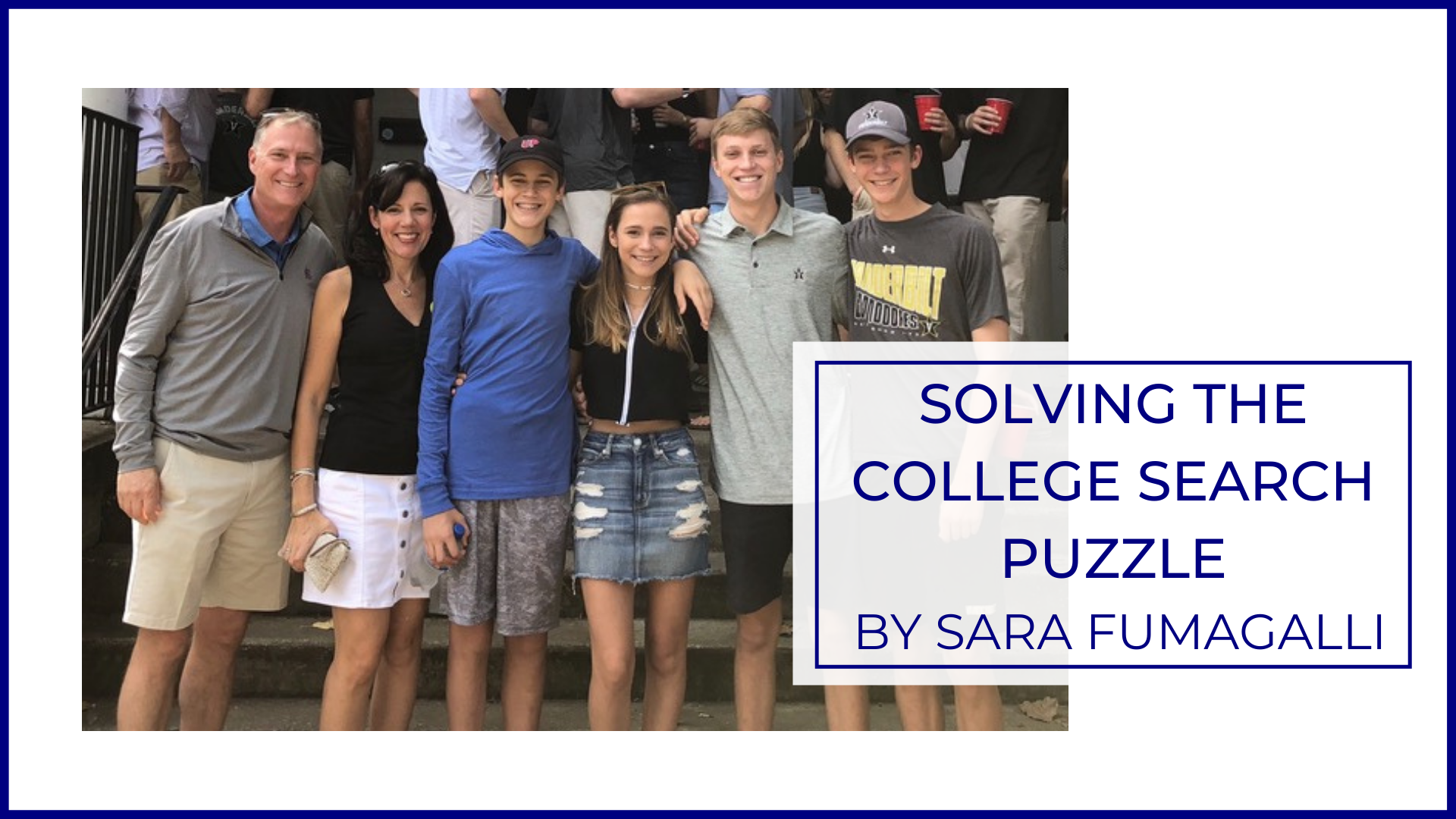As the mother of four children ages 17 to 23, I often I hear, “I can’t believe you’ve had to go through the college search four times!” The truth is, I love the college process. For my analytical brain, its like solving a puzzle- looking at lots of different numbers alongside each child’s academic and social interests. Just as every student is unique, each college search is as well. While there has been some overlap between my kids’ college lists, there have been many differences, which reflect their personal preferences. My daughter didn’t want to subject herself to cold weather, yet one of my sons is attending a university on the brisk shoreline of Lake Michigan. We are currently in the thick of applications with our youngest, and I love visiting schools and seeing his reaction to various campuses, as he tries to picture himself there next year. Our favorite Queen Bee Samantha asked if I’d share my thoughts about this sometimes arduous and stressful process with the 305 community. Below are what I have found to be the key guideposts for parents shepherding their students through a college search.

#1: Admissions decisions can be a bit of a mystery. This might seem obvious, but I think it’s the largest undercurrent of stress throughout this entire process. We are a generation of very involved parents- we are fixers. At the end of the day, each university has its own unique process for evaluating candidates and we only know a fraction of its criteria. Furthermore, what happened in the last admissions cycle is not a sure indicator of what will happen with subsequent admissions cycles. Admissions for the Class of 2021 was a clear example of this- COVID prompted most schools to go test optional, triggering applications to sky rocket and acceptance rates to drop. Lastly, any college can change their admissions policies and strategies year-to-year, leaving new applicants wondering about the strength of their candidacies. It is our job as parents to help our kids understand that while their applications are a reflection of their accomplishments to date, the decision to admit or deny admission is not a measure of their self-worth.
#2: It is the applicant’s college experience, not yours. Many of us feel like we could jump right back into college life, sitting in lecture halls during the week and hanging out at parties and tailgates on the weekend. However, when exploring your beloved alma mater for your student, it is tremendously important to recognize how the school has changed in the time since you’ve graduated. This is essential in order to make sure that school is a good fit for your child. My alma mater, Vanderbilt University, is located in Nashville, which in my college years was a laidback, country music city. Nashville has grown tremendously, is a mecca for both the music and healthcare industries, and a hot spot for weekend travel. Vanderbilt has grown in step with Nashville, and while its prestige is on the rise, so is the stress and competitive nature of a group of type A undergrads. As a parent, it has been my job to ensure that my kids fit with Vanderbilt’s culture of today, not thirty years ago.
#3: Universities put a lot of time and energy into every application. I worked at a local university in undergraduate admissions for two years as an application reader, and have reviewed countless applications. Contrary to the urban myth that only eight minutes is spent on each application, a lot of hard work goes into evaluating every candidate, and several people review each application. GPA’s are recalculated- so no need to fret about your student’s weighted versus unweighted GPA, or how your student’s 100-point scale will compare to a five- point GPA system. I’ve read applications from schools outside of the US, schools with 12-point grading systems, and schools without grading systems! Each high school is also evaluated, so that applicants’ transcripts can be better assessed given the rigor offered at their respective high schools. Activities, community service, part-time jobs, and leadership are also reviewed. Then, essays are read and evaluated. In sum, every university has its own, detailed system for analyzing applications that levels the playing field for all candidates.
#4: Your student’s essay needs to be her own and show her personality. A great essay tells the university something new about the applicant, by describing something that differs from the list of activities on the Common App. When I read applications, many students felt the need to weave a tale full of drama. Oftentimes seventeen year-olds don’t have a sensational story in their short lifetimes, and that dramatic essay felt forced. Writing about a quirky attribute of an applicant’s personality, a hobby, or a personal relationship is just as effective and insightful for the reader. A well-constructed essay sets the scene in the first third of the essay, then tells the reader more about the applicant herself for the remaining two-thirds of the essay. Most importantly, the essay also needs to sound like the voice of a senior in high school. Does it have a few adjectives that make you cringe, or heaven forbid, a dangling participle? That’s part of what makes the essay authentic because it is in her voice, not yours. If you think you can get away with sweeping edits to your teen’s essay, just remember this article from a few years ago.
#5: Your high school college counselor is your greatest ally. The best advocate for your student is one that sits right on her high school campus, for several reasons. First, your high school college counselor has fostered strong relationships with your child’s teachers, and those teachers will be writing college recommendation letters. Also, your high school college counselor will write his own recommendation, describing how your student has grown intellectually and socially throughout high school. In addition, your counselor will help you navigate the financial aspects of applying to college- the FAFSA, merit and need-based scholarships, and school-specific scholarships. Finally, your high school counselor has valuable connections with the college and university admissions teams. The more time your student spends with her high school counselor, the better, in order to forge a solid relationship and to have a clear understanding of your student’s college preferences. If you feel you must insert a third party- someone to help with essay writing, or the search process altogether- my humble advice is to keep the communication with your high school counselor open and honest, so that all parties involved with your student’s college search are on the same page.
#6: There may be rejection, and it will sting, but that heartbreak will be short-lived. I’ve noticed that often an applicant’s top choice is a reach school- the allure of getting into that school on her list that is most popular, or most rigorous, is so strong. Yet, the reason why it’s a reach school is because it’s a bit out of reach. So, yes, there will be many applicants that are heartbroken when acceptances are released. To some degree, that heartbreak is also skewed with a bit of embarrassment- having to go to school and tell friends she hasn’t been accepted. However, I have met countless kids who were rejected from their #1 choice, and are in love with the school they ended up attending. Assuming an applicant has a strong college list filled with schools where she feels comfortable, she will land at a place where she will flourish for four years. Simply put, an applicant can pick a wrong school, but there are so many right schools!
My youngest will graduate this May, and I know in my heart that he will end up at a school where he will grow into adulthood with the help of inspiring professors and classmates. Still, there are moments of “what if” stress- what if he isn’t admitted, what if he doesn’t fit in? Then, I look back at his college list, and am so grateful for the expertise of his high school college counselor, for the time our family put in watching school videos and touring campuses this past summer and fall, and for my son’s hard work on his applications. We have all been completing this one-of-a-kind puzzle together, and I can’t wait to see what college sweatshirt he’s wearing on May 1st.



